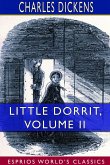Our Mutual Friend, written in the years 1864-65, is the last novel completed by Charles Dickens and is one of his most sophisticated works, combining savage satire with social analysis. It centers on, in the words of critic J. Hillis Miller, quoting from the character Bella Wilfer in the book, "money, money, money, and what money can make of life". Most reviewers in the 1860s continued to praise Dickens' skill as a writer in general, although not reviewing this novel in detail. Some found the plot both too complex and not laid out well.
Hinweis: Dieser Artikel kann nur an eine deutsche Lieferadresse ausgeliefert werden.
Hinweis: Dieser Artikel kann nur an eine deutsche Lieferadresse ausgeliefert werden.








